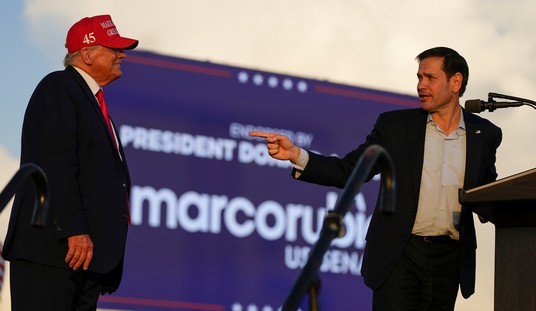… it’s close. It’s also close to the worst fifth presidential year on record, excluding Richard Nixon, who should be considered an outlier. If you start approaching Nixonian numbers in a second term, you don’t need Gallup to tell you where you stand. Barack Obama’s average job-approval rating in Gallup polling for 2013 was 45.8%, slightly above 2011’s 44.4% but down from 2012’s 48.1%:
 The problem here for Obama is the trend:
The problem here for Obama is the trend:
The results are based on more than 175,000 Gallup Daily tracking interviews conducted throughout Obama’s fifth year in office, from Jan. 20, 2013 (also the start of his second term), through Jan. 19, 2014.
On the heels of his re-election victory, Obama’s fifth year started off strongly, with consistent majority approval. However Americans’ approval of Obama declined over the course of 2013. His latest Gallup Daily tracking job approval rating, based on Jan. 17-19 interviewing, is 40%, just two points above his personal low approval rating.
From a historical perspective, Obama’s fifth-year approval average is in the lower range. It is similar to George W. Bush’s 45.7%, but lower than those for Dwight Eisenhower, Ronald Reagan, and Bill Clinton. Obama’s fifth-year average exceeds Richard Nixon’s 41.1% in the year ending Jan. 19, 1974. Nixon’s fifth-year approval rating reflected declining support as the Watergate scandal unfolded, but his fifth year ended well before he resigned from office.
Obama wound up with almost identical fifth-year numbers as George W. Bush, which is (for political purposes) not much better off than hitting the Nixon Line. Of the six American Presidents to have a fifth year in office since Gallup started regular job-approval polling, only Obama, Bush, and Nixon failed to hit 50%. Needless to say, the other two Presidents didn’t have happy second terms, even by the usual lower expectations of second terms.
The trend for Obama is looking perhaps more grim than this indicates, too. The most recent quarter was almost the worst of his presidency, and the line is still trending downward. Obama hit a nadir of 41.0% in his eleventh quarter, and almost hit that in this past quarter (Q20) at 41.2%. That is a 10-point drop from 51.9% in Q16, and more than a three-point drop from Q19’s 44.5%.
Bush not only had an unhappy second term, he had a disastrous midterm in his sixth year. Sean Trende links presidential approval state-by-state to second-term midterms, and concludes that Democrats should be afraid of the upcoming election — very afraid:
What I’m really interested in here, though, is that in the 31 competitive Senate races held in 2010 and 2012, the Democratic candidate has run within five points of the president’s job approval in 23 of them (75 percent). Additionally, no Democratic candidate in a competitive race has run more than 10 points ahead of the president’s job approval (or behind it).
Now, the fact that a Democratic candidate hasn’t run more than 10 points ahead of the president’s job approval doesn’t mean that a candidate can never do so. At the same time, this is noteworthy, and is perhaps suggestive of the difficulties of doing so in a hyper-polarized age.
So what does this tell us about 2014? Without getting too far into the weeds, I estimated the president’s job approval in each state as of Election Day 2012 based on the exit polls, then tracked what it might look like with various measurements in the RCP Average. I assumed a uniform swing in states — in other words, if it falls five points nationally, it would fall five points in each state. …
The Democrats still lead in most of these states, sometimes by healthy margins. But we can’t escape the suggestion that their future is bound up with the president’s job approval. Now, to be clear, in some of these races the Republican challenger will flame out, and the Democrat will begin to run ahead of the president’s job approval. If Al Franken’s opponent doesn’t catch fire — which is perfectly plausible — Franken will probably win by a decent margin. Likewise, Republicans in Iowa and Colorado are, respectively, either untested or have tested poorly.
But some of these challengers will catch fire, and some of these races will surprise us. If the president’s job approval is still around 43 percent in November — lower than it was on Election Day in 2010 — the question would probably not be whether the Democrats will hold the Senate, but whether Republicans can win 54 or 55 seats. Given the numbers right now, that should not be unthinkable.
The challenge will be to track that approval rating as the employer mandate hits in the fall and the pain of ObamaCare disruptions multiplies dramatically. It may be impossible to track that within such a short period, but the impact will be catastrophic for Obama — unless he postpones the whole mess again.








Join the conversation as a VIP Member